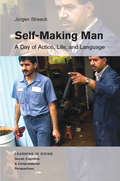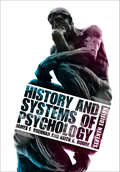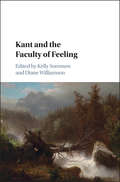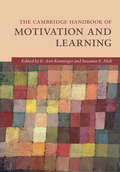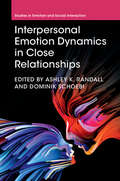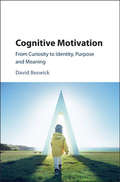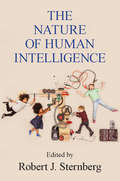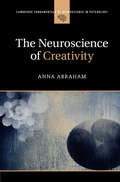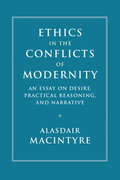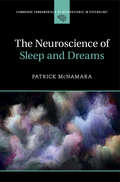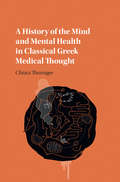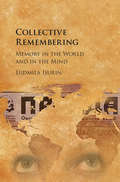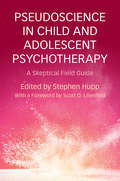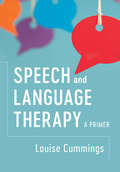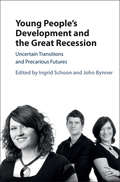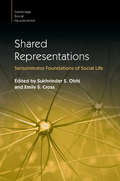- Table View
- List View
Self-Making Man: Social, Cognitive and Computational Perspectives)
by Jürgen StreeckThis book portrays one day in the communicative life of the owner of an auto repair-shop in Texas. He walks, looks, points, shows and explains engines, makes sense by gesture, speaks, manages, makes his life-world, and in the process reproduces social structures and himself as individual. Self-Making Man is the first comprehensive study of a communicating person; it reveals socially shared and personal practices, as well as improvisational actions by which a person inhabits and makes sense of the world with others. After decades of discussion on embodiment, this study is the first to investigate one body in its full range of communicative activities. Grounded in phenomenology and committed to the methodological rigor of context analysis and conversation analysis, Self-Making Man departs radically from contemporary research practice: it shows that, to take embodiment in human interaction seriously, we must conceive of it as individuation and organic, self-sustaining life: as autopoeisis. Proposes a new perspective on embodiment in social interaction. Rich in ethnographic detail and shows how all of the human senses are deployed moment by moment in 'sense-making' and social interaction. Provides new empirical insights into communication modalities (gaze, gesture, speech, etc.) and their roles in social interaction.
The Late Sigmund Freud
by Todd DufresneFreud is best remembered for two applied works on society, The Future of an Illusion and Civilization and its Discontents. Yet the works of the final period are routinely denigrated as merely supplemental to the earlier, more fundamental 'discoveries' of the unconscious and dream interpretation. In fact, the 'cultural Freud' is sometimes considered an embarrassment to psychoanalysis. Dufresne argues that the late Freud, as brilliant as ever, was actually revealing the true meaning of his life's work. And so while The Future of an Illusion, Civilization and its Discontents, and his final work Moses and Monotheism may be embarrassing to some, they validate beliefs that Freud always held - including the psychobiology that provides the missing link between the individual psychology of the early period and the psychoanalysis of culture of the final period. The result is a lively, balanced, and scholarly defense of the late Freud that doubles as a major reassessment of psychoanalysis of interest to all readers of Freud.
History and Systems of Psychology: Pearson New International Edition
by James F. Brennan Keith A. HoudeComprehensive yet accessible, a classic survey of the history and systems of psychology -- from pre-Socratic philosophers to contemporary contributions from cognitive science and neuroscience is presented. Part I traces psychology's historical foundations from its beginnings to its emergence as a formal discipline in the 1870s. Part II deals with the major twentieth-century systems of psychology.
Kant and the Faculty of Feeling
by Diane Williamson Kelly SorensenKant stated that there are three mental faculties: cognition, feeling, and desire. The faculty of feeling has received the least scholarly attention, despite its importance in Kant's broader thought, and this volume of new essays is the first to present multiple perspectives on a number of important questions about it. Why does Kant come to believe that feeling must be described as a separate faculty? What is the relationship between feeling and cognition, on the one hand, and desire, on the other? What is the nature of feeling? What do the most discussed Kantian feelings, such as respect and sublimity, tell us about the nature of feeling for Kant? And what about other important feelings that have been overlooked or mischaracterized by commentators, such as enthusiasm and hope? This collaborative and authoritative volume will appeal to Kant scholars, historians of philosophy, and those working on topics in ethics, aesthetics, and emotions.
The Cambridge Handbook of Motivation and Learning (Cambridge Handbooks in Psychology)
by K. Ann Renninger Suzanne E. HidiWritten by leading researchers in educational and social psychology, learning science, and neuroscience, this edited volume is suitable for a wide-academic readership. It gives definitions of key terms related to motivation and learning alongside developed explanations of significant findings in the field. It also presents cohesive descriptions concerning how motivation relates to learning, and produces a novel and insightful combination of issues and findings from studies of motivation and/or learning across the authors' collective range of scientific fields. The authors provide a variety of perspectives on motivational constructs and their measurement, which can be used by multiple and distinct scientific communities, both basic and applied.
Interpersonal Emotion Dynamics in Close Relationships (Studies in Emotion and Social Interaction)
by Ashley K. Randall Dominik SchoebiEmotions play a powerful role in close relationships. Significant progress has been made in understanding the temporal features of emotions associated with the development and maintenance of close relationships across the lifespan. This advancement has revealed further questions: which theories help conceptualize interpersonal emotion dynamics? What are the ways researchers can assess and model these dynamics? How do interpersonal emotion dynamics manifest in different close relationships? And do these emotion dynamics contribute to the maintenance or dissolution of relationships? Interpersonal Emotion Dynamics in Close Relationships addresses these and other questions by bringing together state-of-the-art perspectives from scholars widely recognized for their contributions to the study of emotions in relationships. Each chapter defines interpersonal emotion dynamics, reviews methodological or empirical work, and offers important directions for future research. This volume will be a valuable resource for students, researchers, and practitioners interested in understanding the role of emotions in relationships.
Cognitive Motivation: From Curiosity to Identity, Purpose and Meaning
by David BeswickMotivation and cognition were treated as separate concepts throughout most of twentieth-century psychology. However, in recent years researchers have begun viewing the two as inextricably intertwined: not only does what we want affect how we think, but how we think affects what we want. In this innovative study, Beswick presents a new general theory of cognitive motivation, synthesizing decades of existing research in social, cognitive and personality psychology. New basic concepts are applied to a wide range of purposive behaviour. Part I of the volume reviews different forms of cognitive motivation, such as curiosity, cognitive dissonance, achievement motivation, and the search for purpose and meaning, while Part II examines the basic processes that underlie it, such as working memory, attention and emotion. The central concept is the incomplete gestalt, in which motivation is generated by a universal striving to integrate information and make sense at all levels of cognitive organization.
Language Learning and the Brain: Lexical Processing in Second Language Acquisition
by Ulf SchützeEvery person who encounters or learns another language is faced with the challenge of processing many new words in a short period of time. What are the conditions under which a learner can acquire those words successfully and process them to long-term memory? How do language and memory faculties interact? What role do the senses play in this process? Are factors such as age or individual backgrounds of learners to be considered? Taking the reader on a fascinating journey through the brain to demonstrate how language is processed, Ulf Schütze explains the dynamic environment involved in recording and producing words. The book also discusses how to use information technology, such as Apps, to make the learning of words entertaining and efficient. Describes learning words in another language as a dynamic and fluid process. Provides a strong research base in second language acquisition, psycholinguistics, cognitive psychology, and neurophysiology. Outlines practical applications that are helpful for learners, teachers, researchers, and the general public.
Funds of Identity: Social, Cognitive and Computational Perspectives)
by Moisès Esteban-GuitartDrawing on research conducted mostly in Catalonia (Spain), Moisès Esteban-Guitart outlines a distinct vision of education enhanced by students' identities, which leads to a discussion of the sociocultural factors that shape the processes of learning. He brings these ideas to life by examining traits of a mobile-centric society, the present-day ecology of learning, and his three metaphors of learning (connecting knowledge, connecting minds, and connecting communities). He then suggests a number of basic principles regarding learning for the twenty-first century based on prior literature in the learning sciences. He presents the terms 'funds of identity' and 'meaningful learning experiences', and reviews the funds of knowledge approach and the Vygotskian basis for understanding identity. In the second part of the book, he illustrates a number of strategies for detecting students' funds of identity and their meaningful learning experiences, and describes some practical experiences based on the theoretical framework he adopted. Revises theoretical principles for education in the twenty-first century. Develops and illustrates how to use students' identity pedagogically. Addresses the situated and distributed nature of learning.
The Nature of Human Intelligence: The Impact Of Tools On The Nature And Development Of Human Abilities (Educational Psychology Ser.)
by Robert J. SternbergThe study of human intelligence features many points of consensus, but there are also many different perspectives. In this unique book Robert J. Sternberg invites the nineteen most highly cited psychological scientists in the leading textbooks on human intelligence to share their research programs and findings. Each chapter answers a standardized set of questions on the measurement, investigation, and development of intelligence - and the outcome represents a wide range of substantive and methodological emphases including psychometric, cognitive, expertise-based, developmental, neuropsychological, genetic, cultural, systems, and group-difference approaches. This is an exciting and valuable course book for upper-level students to learn from the originators of the key contemporary ideas in intelligence research about how they think about their work and about the field.
The Neuroscience of Creativity (Cambridge Fundamentals of Neuroscience in Psychology)
by Anna AbrahamWhat happens in our brains when we compose a melody, write a poem, paint a picture, or choreograph a dance sequence? How is this different from what occurs in the brain when we generate a new theory or a scientific hypothesis? In this book, Anna Abraham reveals how the tools of neuroscience can be employed to uncover the answers to these and other vital questions. She explores the intricate workings of our creative minds to explain what happens in our brains when we operate in a creative mode versus an uncreative mode. The vast and complex field that is the neuroscience of creativity is disentangled and described in an accessible manner, balancing what is known so far with critical issues that are as yet unresolved. Clear guidelines are also provided for researchers who pursue the big questions in their bid to discover the creative mind.
Ethics in the Conflicts of Modernity
by Alasdair MacintyreAlasdair MacIntyre explores some central philosophical, political and moral claims of modernity and argues that a proper understanding of human goods requires a rejection of these claims. In a wide-ranging discussion, he considers how normative and evaluative judgments are to be understood, how desire and practical reasoning are to be characterized, what it is to have adequate self-knowledge, and what part narrative plays in our understanding of human lives. He asks, further, what it would be to understand the modern condition from a neo-Aristotelian or Thomistic perspective, and argues that Thomistic Aristotelianism, informed by Marx's insights, provides us with resources for constructing a contemporary politics and ethics which both enable and require us to act against modernity from within modernity. This rich and important book builds on and advances MacIntyre's thinking in ethics and moral philosophy, and will be of great interest to readers in both fields.
The Neuroscience of Sleep and Dreams (Cambridge Fundamentals of Neuroscience in Psychology)
by Patrick McNamaraThis book provides a complete introduction to the neuroscience of sleep and dreams in plain language. In it, Patrick McNamara outlines new discoveries in the science of sleep and dreams, places them within an evolutionary context, and brings them together with existing scientific findings and implications for sleep medicine. Unlike other introductory texts, the important evolutionary background and social nature of sleep and dreams is emphasized. Major advances in sleep medicine, sleep and memory, dream content analyzes, brain correlates of sleep stages and lifespan development of sleep are covered in depth. While the text is geared towards students, the general reader and scientists studying other disciplines will find it accessible and informative.
Current Perspectives in Social and Behavioral Sciences: Nurturing Creativity in the Classroom
by Beghetto Ronald A. Kaufman James C.As interest in creativity explodes, it has become more complicated to decide how to best nurture creativity in our schools. There are the controversial Common Core Standards in many states. Meanwhile, the classroom has become increasingly digital; it is easier to access information, communicate ideas, and learn from people across the world. Many countries now include cultivating creativity as a national educational policy recommendation, yet there is still debate over best practices. Indeed, many well-intentioned educators may institute programs that may not reach the desired outcome. The notion that schools 'kill creativity' has become a widespread social meme. We view such beliefs as both hyperbolic and problematic: they allow us to recognize there is a problem but not solve it. In this book, a wide array of international experts addresses these issues, discussing theories and research that focus on how to nurture creativity in K-12 and college-level classrooms.
A History of the Mind and Mental Health in Classical Greek Medical Thought
by Chiara ThumigerThe Hippocratic texts and other contemporary medical sources have often been overlooked in discussions of ancient psychology. They have been considered to be more mechanical and less detailed than poetic and philosophical representations, as well as later medical texts such as those of Galen. This book does justice to these early medical accounts by demonstrating their richness and sophistication, their many connections with other contemporary cultural products and the indebtedness of later medicine to their observations. In addition, it reads these sources not only as archaeological documents but also in the light of methodological discussions that are fundamental to the histories of psychiatry and psychology. As a result of this approach, the book will be important for scholars of these disciplines as well as those of Greek literature and philosophy, strongly advocating the relevance of ancient ideas to modern debates.
Collective Remembering: Memory in the World and in the Mind
by Ludmila IsurinThis interdisciplinary study explores collective memory as it is presented by official producers (such as textbooks and media) and reflected by consumers (group members). Focusing on a case study of Russians and Russian immigrants to the USA and their memories of seminal events in the twentieth-century Russian collective past, Isurin shows how autobiographical memory contributes to the formation of collective memory, and also examines how the memory of the shared past is reconstructed by those who stayed with the group and those who left. By bringing together historical, anthropological, and psychological approaches, Collective Remembering provides a new theoretical framework for memory studies that incorporates both content analysis of texts and empirical data from human participants, thus demonstrating that methodologies from the humanities and the social sciences can complement each other to create a better understanding of how memory works in the world and in the mind.
Pseudoscience in Child and Adolescent Psychotherapy: A Skeptical Field Guide
by Stephen HuppMost infants, children, and adolescents facing mental health challenges - including autism, psychosis, mania, depression, anxiety, and substance use - do not receive evidence-based treatments. Instead, they commonly receive ineffective and even harmful treatments. In this book, leading experts from the fields of clinical psychology, school psychology, developmental psychology, pediatric neurology, applied behavior analysis, and social work identify the most problematic psychotherapy interventions used for each mental health issue. In addition to these primary authors, each chapter includes a side bar from a specialist representing the disciplines of pediatrics, anthropology, neuroscience, and psychology. The contributors work in academia, hospitals, and private practice and include book authors, podcasters, and even a filmmaker. Not only does this book highlight the threats of potentially harmful pseudoscience, it also summarizes treatments that actually have a strong evidence base and deliver far more positive results.
Speech and Language Therapy: A Primer
by Louise CummingsProviding a comprehensive introduction to speech and language therapy, this book introduces students to the linguistic, medical, scientific and psychological disciplines that lie at the foundation of this health profession. As well as examining foundational disciplines the volume also addresses professional issues in speech and language therapy and examines how therapists assess and treat clients with communication and swallowing disorders. The book makes extensive use of group exercises that allows SLT students opportunity for practice-based learning. It also includes multiple case studies to encourage discussion of assessment and intervention practices and end-of-chapter questions with complete answers to test knowledge and understanding. As well as providing a solid theoretical grounding in communication disorders, this volume will equip students with a range of professional skills, such as how to treat patients, how to diagnose and assess clients, how to help parents support children with communication disabilities, and how to assess the effectiveness of the various practices and methods used in intervention.
Young People’s Development and the Great Recession: Uncertain Transitions and Precarious Futures
by Ingrid Schoon John BynnerThe 2007–8 financial crisis and subsequent 'Great Recession' particularly affected young people trying to make their way from education into the labour market at a time of economic uncertainty and upheaval. This is the first volume to examine the impact of the Great Recession on the developmental stage of young adulthood, a critical phase of the life course that has great significance in the foundations of adult identity. Using evidence from longitudinal data sets spanning three major OECD countries, these essays examine the recession's effects on education and employment outcomes and consider the wider psycho-social consequences, including living arrangements, family relations, political engagement, and health and well-being. While the recession intensified the impact of pre-existing trends towards a prolonged dependence on parents and, for many, the precaritisation of life chances, the findings also point to manifestations of resilience, where young people countered adversity by forging positive expectations of the future. Recasts the concept of youth transitions within a contemporary life course perspective, taking into account micro and macro influences Provides a more holistic understanding of recession effects, and offers pointers where new policy regarding, for example, education and training is urgently needed; Draws on data collected for a number of large-scale, national representative and longitudinal data sets; Illustrates the role of social policy in buffering the effects of the recession, and how these vary across countries.
Cambridge Social Neuroscience: Shared Representations
by Obhi Sukhvinder S. Cross Emily S.Socially situated thought and behaviour are pervasive and vitally important in human society. The social brain has become a focus of study for researchers in the neurosciences, psychology, biology and other areas of behavioural science, and it is becoming increasingly clear that social behaviour is heavily dependent on shared representations. Any social activity, from a simple conversation to a well-drilled military exercise to an exquisitely perfected dance routine, involves information sharing between the brains of those involved. This volume comprises a collection of cutting-edge essays centred on the idea of shared representations, broadly defined. Featuring contributions from established world leaders in their fields and written in a simultaneously accessible and detailed style, this is an invaluable resource for established researchers and those who are new to the field.
Prostitutes and Matrons in the Roman World
by Anise K. StrongProstitutes and Matrons in the Roman World is the first substantial account of elite Roman concubines and courtesans. Exploring the blurred line between proper matron and wicked prostitute, it illuminates the lives of sexually promiscuous women like Messalina and Clodia, as well as prostitutes with hearts of gold who saved Rome and their lovers in times of crisis. It also offers insights into the multiple functions of erotic imagery and the circumstances in which prostitutes could play prominent roles in Roman public and religious life. Tracing the evolution of social stereotypes and concepts of virtue and vice in ancient Rome, this volume reveals the range of life choices and sexual activity, beyond the traditional binary depiction of wives or prostitutes, that were available to Roman women.
Scientists Making a Difference
by Sternberg, Robert J. and Fiske, Susan T. and Foss, Donald J. Robert J. Sternberg Susan T. Fiske Donald J. FossScientists Making a Difference is a fascinating collection of first-person narratives from the top psychological scientists of the modern era. These readable essays highlight the most important contributions to theory and research in psychological science, show how the greatest psychological scientists formulate and think about their work, and illustrate how their ideas develop over time. In particular, the authors address what they consider their most important scientific contribution, how they got the idea, how the idea matters for the world beyond academic psychology, and what they would like to see as the next steps in research. The contributors, who were chosen from an objectively compiled list of the most eminent psychological scientists, provide a broad range of insightful perspectives. This book is essential reading for students, researchers and professionals interested in learning about the development of the biggest ideas in modern psychological science, described firsthand by the scientists themselves.
Advances in Personal Relationships: Personality and Close Relationship Processes
by Stanley O. Gaines Jr.Few observers of relationship dynamics would dispute the claim of interdependence theorists that a defining feature of close relationships is the extent to which partners influence each other's thoughts, feelings, or behaviors. However, partners do not behave simply in response to each other's behavior; both partners in a given relationship bring themselves - indeed, their selves - into the relationship as well. Not only are individuals' selves enormously complex and rich in content, but so too are the multitude of personality characteristics, including traits, values, attitudes, motives, and emotions, that contribute to selves' richness. Gaines, Jr provides a major integration of research on personality with research on relationship science, and demonstrates how personality constructs can be readily incorporated into the two most influential theories of close relationships: attachment theory and interdependence theory. This study will be of value to scholars in the fields of close relationships, personality psychology, communication studies, and family studies.
The Dialogical Mind: Common Sense and Ethics
by Ivana MarkováDialogue has become a central theoretical concept in human and social sciences as well as in professions such as education, health, and psychotherapy. This 'dialogical turn' emphasises the importance of social relations and interaction to our behaviour and how we make sense of the world; hence the dialogical mind is the mind in interaction with others - with individuals, groups, institutions, and cultures in historical perspectives. Through a combination of rigorous theoretical work and empirical investigation, Marková presents an ethics of dialogicality as an alternative to the narrow perspective of individualism and cognitivism that has traditionally dominated the field of social psychology. The dialogical perspective, which focuses on interdependencies among the Self and Others, offers a powerful theoretical basis to comprehend, analyse, and discuss complex social issues. Marková considers the implications of dialogical epistemology both in daily life and in professional practices involving problems of communication, care, and therapy. Proposes dialogicality as the epistemology of common sense. Highlights the ethical nature of the Self-Other(s) interdependence in its cultural and historical contexts. Emphasises the importance of dialogical epistemology for professional practices.
Studies in the Social and Cultural History of Modern Warfare: Shell-Shock and Medical Culture in First World War Britain
by Tracey LoughranShell-Shock and Medical Culture in First World War Britain is a thought-provoking reassessment of medical responses to war-related psychological breakdown in the early twentieth century. Dr Loughran places shell-shock within the historical context of British psychological medicine to examine the intellectual resources doctors drew on as they struggled to make sense of nervous collapse. She reveals how medical approaches to shell-shock were formulated within an evolutionary framework which viewed mental breakdown as regression to a level characteristic of earlier stages of individual or racial development, but also ultimately resulted in greater understanding and acceptance of psychoanalytic approaches to human mind and behaviour. Through its demonstration of the crucial importance of concepts of mind-body relations, gender, willpower and instinct to the diagnosis of shell-shock, this book locates the disorder within a series of debates on human identity dating back to the Darwinian revolution and extending far beyond the medical sphere.
